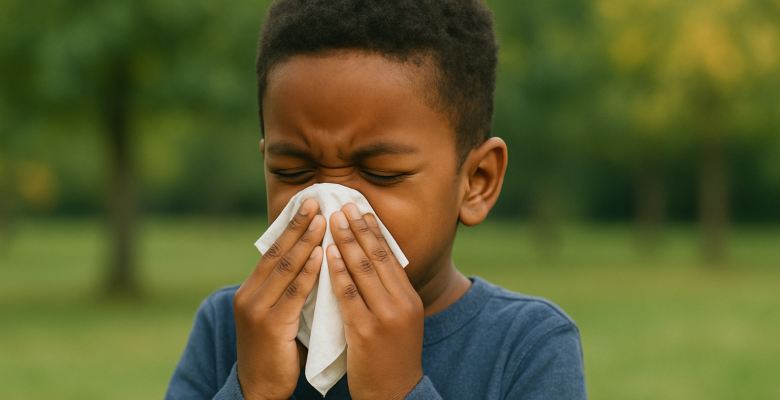What are seasonal allergies?
Seasonal allergies (also called hay fever) are allergic reactions that happen due to allergens in the air, such as pollen from grasses, weeds, and trees. These allergens enter the eyes, nose, and throat and cause the immune system to react excessively – causing symptoms such as itchy eyes and nasal congestion. These symptoms usually come seasonally depending on the allergen (tree pollen in the spring, grasses in spring and summer, weeds in summer and fall).
What are the symptoms of allergies?
The symptoms can often look like the common cold, but typically last longer and seem to come at the same time every year. Symptoms include:
- Runny nose
- Nasal congestion
- Sneezing/snorting
- Itchy/watery eyes
- Throat clearing
- Nose rubbing/itchy nose
When do allergies develop?
Kids can develop allergies at any time, even if they haven’t had symptoms in previous years. A child must be exposed to the allergens before developing allergies, so kids under 2 years old are less likely to have seasonal allergies.
Symptoms can vary between years, depending on how much pollen is in the air due to weather and rain variations. Symptoms will also depend on where you live, there might be different allergies in different regions of the country.
If parents have seasonal allergies their children have a higher chance of also having allergies. Children with asthma and eczema are also at higher risk of seasonal allergies.
Should my child be tested for allergies?
Most children with mild seasonal allergies do not need testing. Knowing what pollens are causing the allergies usually won’t change our treatment plan. Children with severe allergy symptoms despite treatment may need to see an allergist for further testing and care.
How do you treat seasonal allergies?
- Avoidance of the allergen when possible (although often difficult)
- Keep home and car windows closed in the season to decrease exposure
- Run a HEPA filter in the bedroom
- Take a bath or shower nightly, rinsing off skin and hair and removing allergens that might be on your child
- Wash bedding often in hot water
- Nasal saline rinses before bed to rinse out allergens and decrease congestion
- If pets might be part of the problem, keep them off your child’s bed and out of bedrooms
- Medications:
- Short acting allergy medication (Benadryl or the generic version) is good for intermittent symptoms (just to something specific like the lawn just being mowed). This can reduce symptoms for 4-6 hours but may cause drowsiness.
- Over the counter allergy eye drops such as Zatador or Pataday (or the generic versions) can help if your child has mainly itchy eye symptoms. Children under 3 might not tolerate eye drops very well.
- Nasal steroid sprays such as Flonase or Nasonex (or the generic versions) can be used if symptoms are mainly itchy nose, runny nose, or congestion. A nasal saline rinse should be used prior to the steroid spray to help clean out the allergens. The nasal sprays also don’t provide immediate relief; they need to be used daily and can take 5-7 days to really help.
- Long-acting allergy medications such as Claritin or Zyrtec (or the generic version) can be used if your child has multiple symptoms. They are also easy to give and come in chewable and liquid forms. These are usually once a day dosing and are less likely to cause drowsiness.

